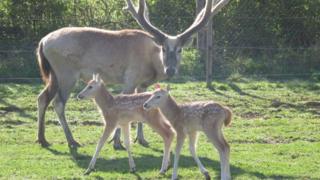
Image copyright
ZSL
Zoos’ vital conservation work is being put at risk by a Covid-related funding crisis.
Breeding programmes to rescue rare species may have to be cancelled, with many zoos facing the biggest cash crisis in their history.
The body that represents British zoos says a government rescue package is inaccessible for most of its members.
Only one zoo has claimed successfully, the BBC has learned.
Zoos face huge income losses due to lockdown and reduced visitor numbers. Ultimately, this will impact on their ability to care for species which are the last of their kind on Earth, and now found only in zoos.
“The extinct-in-the-wild species are absolutely dependent on human care,” said Dr John Ewen of the Zoological Society of London (ZSL).
“It’s our decision about which way to go forward that determines extinction or recovery.”
Image copyright
Getty Images
BBC News has discovered that just one zoo out of around 300 in England has successfully made a claim from a £100m government recovery fund.
The trade body that represents Britain’s zoos and aquariums, Biaza, says the way the government’s bailout fund is structured means it is virtually impossible for most of its members to claim.
They need to be 12 weeks from bankruptcy to qualify and by that time any responsible animal park would already be trying to find new homes for its residents, the association says.
It warns that many international breeding programmes, designed to ensure the survival of rare species, may have to be cancelled and without government help some big UK zoos face closure.
The government says its rescue package was designed to provide a safety net if zoos got into really serious financial difficulties.
Image copyright
ZSL
Zoos are one of the largest funders of conservation work around the world, particularly large, successful zoos in Europe, North America and Australia.
Dr Alexandra Zimmermann is a senior research fellow at Oxford University and former head of conservation at Chester Zoo.
She told BBC News: “Zoos contribute hundreds of millions of support all over the world for conservation in the wild so if we lose a lot of that support from the effects of Covid, then that has really detrimental effects on conservation everywhere.”
At least 77 species of plants and animals are classified as extinct in the wild by the International Union for the Conservation of Nature (IUCN), which compiles data on endangered species.
The Guam kingfisher is one such bird, disappearing in the 1980s from the island of Guam, a US territory in the western Pacific.
A stowaway snake was accidently brought in on military equipment, where it wreaked havoc on the ecosystem. With no natural predator, the snake species rapidly multiplied, eventually growing to such a number that it ate most of the island’s native bird species.
Image copyright
John Ewen/ZSL
The last few kingfishers on Earth were rescued and taken into captivity. There are now 100 or so birds in breeding programs at US zoos, with plans to reintroduce them to Guam and other suitable islands, if a safe habitat can be found.
Many of the zoos were already under strain to breed enough birds to keep the population going, even before the pandemic, said Dr Ewen.
“Covid’s come along and put incredible pressure on all of the institutions that care for them,” he added.
Image copyright
Getty Images
Since many of the “last stand” species have gone extinct in the wild due to human actions, we have a responsibility to save them, said Dr Amanda Trask of ZSL.
“It’s crazy not to take that chance and try and bring them back,” she said.
Lockdown has placed many zoos around the world in a precarious financial situation. While many institutions have reopened, reduced visitor capacities due to social distancing are adding to the financial pressures.
Zoos face huge bills from caring for animals; ZSL’s monthly running costs were £2.3 million at the height of lockdown and it stands to lose £20 million this financial year.
Some small zoos have already closed down while others are reducing conservation work.
Dr Matyas Liptovszky, honorary assistant professor of zoo animal medicine at the University of Nottingham, said species kept alive in zoos and botanical gardens are “the last safeguards of irreplaceable parts of our worlds”.
The UK spends hundreds of millions annually on museums to preserve cultural and historic relics, but not in keeping extinct animals alive, he said, describing this as “bizarre” for a nature and animal-loving nation.
“One of the biggest differences between a great UK museum, which preserves remnants of already extinct animals, and a great UK zoo, which fights to keep alive another one on the way to extinction, is the complete lack of government funding for the latter one,” he said.
“Their visitor revenue is directly funding vital conservation and scientific work, but with no or reduced number of visitors, they deserve and desperately need external help”.
Follow Helen on Twitter.
Read MoreFeedzy


